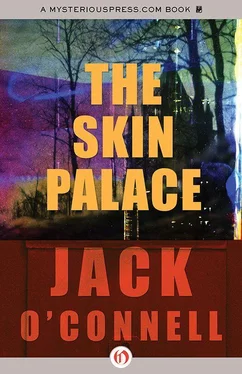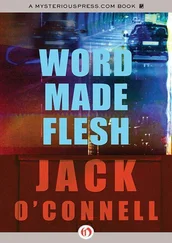She rubs her eyes, opens them, stares at the photographs.
Here are the things she knows.
No, here are the things she believes she knows: There is nothing erotic about these photographs in front of her.
She understands how subjective a judgment that is. She realizes that there are individuals who could find the erotic in a landfill or an ad for mouthwash, people who could manage to insert some idea of eroticism into any image they happen upon. But she believes that the majority of people, confronted with these seven pictures, would not attach the adjective, the concept, of erotic to them.
There is something extraordinary about these photographs.
She knows what they aren’t. But it’s something else entirely to define what they are. They are ethereal, but at the same time rooted in an earthy, actually grimy, setting. They are tender, and yet that tenderness feels overlaid with a fear, a vague conviction that something malignant is within reach. They are tragic and yet the more she looks at each one, the more she’s convinced of this unexplainable, unjustifiable sense of endurance emanating from the mother figure. Maybe even from the infant. More than anything, she wants to say the prints are haunting, like touchstones for memories that could unseat someone’s entire sense of the world. The pictures scare her, and yet she can’t turn away from them. They sadden her, and yet she can’t get enough.
There is no way to be sure these prints were taken by Terrence Propp.
Or, for that matter, that the man she spent this evening with, the man who took her to his underground lair and the flea market and the movie theatre, the man who photographed her at Gompers Station, there is no way to know that that man is Terrence Propp. Terrence Propp could be Jack Derry. He could be Mr. Quevedo. He could be dead and buried. He could be continents away, having renounced photography and his own past. He could be an empty legend created by a slick entrepreneur with the eye of an artist.
Whoever the man was tonight, he posed me in the same manner as the Madonna in these pictures.
Which means he must know about these pictures. Which suggests that it’s likely he did take these pictures. Which suggests that the Aquinas was placed in her hands on purpose, that the events of the past several days are much more than coincidence, are likely part of a plan, a strategy, a system for manipulating where she goes and what she thinks.
Someone wanted me to have these pictures.
She gets up off the stool and unclips the last print in the series, brings it to the worktable and holds a magnifying glass over it. She bends down, peers over the print, focuses on the mother’s face, stares at the shadow that obscures her features.
Propp’s voice comes to her.
There are stunning similarities.
She drops the magnifying glass. She walks to the dryline and steps in front of each photograph. She looks at the mother. She looks at the infant. She looks back to the mother.
She doesn’t want it to hit her, but of course it does, with the kind of vengeful, crippling intensity that can only pass over you once in a life span. She sinks down on the floor below the seven pictures and she begins to weep. Her arms and shoulders start to shake slightly and her nose begins to run. She tries to stifle any noise and manages only a soft keen, like a small animal caught in an even smaller space.
Epiphanies of this nature don’t grow out of a logical progression of facts. They don’t evolve from a rational chain of deduction and analysis. They simply appear, unexpected and uninvited, like a car out of control that changes the life of every person it collides with.
She cries even though she knows that it’s a waste of energy to try to fight this kind of knowledge. This certainty. This simple but horrible idea. It comes at you with the kind of suddenness and persistence you’ve chronically feared in your dreams. It rapes you with a kind of shocking but undeniable certainty. It takes your body, without warning or explanation, and hurls you brutally across a chasm of protective doubt, across the impediment of absent proof. And it lands you with a bone-rattling crash that no amount of time will allow recovery from.
She hears her throat and her tongue form the word out of the remains of her crying.
Mother.
The last things she’s sure of are the most awful of all.
Terrence Propp is my father.
The Madonna in the pictures is my mother.
And I am the infant at her breast .
The visual is essentially pornographic …
— Fredric Jameson, Signatures of the Visible
The sound of a dog barking wakes Sylvia sometime before dawn. She gets up off the cellar floor and locks up the darkroom without looking at the pictures. She goes back up to the apartment, climbs into bed and falls asleep for another three hours, then showers and gets dressed and walks to the Snapshot Shack.
Now, sitting in the tiny booth with a half hour till opening, there’s no way to stop thinking. The radio is no distraction and Cora’s crossword magazines are all filled in. So she stares out the bubble window at the plaza in front of her, at the whitewashed glass and the realtor’s rental signs and the trash that’s collected on the walkway.
There is no reason to believe that twenty-five years ago, her mother bundled her in a blanket and took her down to an already abandoned and decayed train station. That her mother took a seat on a broken marble pillar and tilted her face toward the man who was her husband and Sylvia’s father. That her mother posed for seven photographs as Sylvia fed at her breast. That the man with the camera deserted them. And that for the next twenty years, up to the time of her death, mother never told daughter a word about any of these events.
There is not a single fact to suggest the validity of this particular story. And yet, Sylvia knows it’s the truth. She knows that this is exactly what took place. She knows the real fiction is comprised of the few details her mother did tell — that her father died before Sylvia was born, that the father was a milkman for a local dairy, that Sylvia had no family to speak of beyond her mother.
“And so what does she do with this knowledge? She thinks about Propp fleeing the Ballard last night and cringes at how close she came to violating the oldest taboo in the world. But should she seek him out now? Go back to Gompers or the Canal Zone cellars and try to find her way to St. Benedict’s?”
On the walk to work, low clouds rolled in and it’s been threatening to rain for the past hour. The air almost has that pre-tornado feel to it, a false stillness, as if this lack of breeze was just an ambush tactic. Sylvia looks at the strip of connected stores again and tries to picture what would happen if a tornado did touch down here. She can imagine the Snapshot Shack itself being torn off its slab and spun into flight, spiraling above Quinsigmond, just like Dorothy Gale’s farmhouse. She can imagine her head stuck out the bubble window, seeing people blown past her — Perry doing an off-balance air-swim, losing all the papers from his monogrammed briefcase, Leni Pauline bumping and grinding into the yonder, tassels revolving with the force of the twister, Hugo Schick maniacally grinning at this spectacle of nature, a hand-held camera filming the flight path of his own demise. And Terrence Propp just letting the winds take him, an ambiguous look on his face, neither terror nor contentment, just a nod in Sylvia’s direction as he passes.
She kills the fantasy and realizes she’s staring at Mrs. Ellis, Jenny’s tormented, agonized mother. The woman has her ever present “Missing” posters tucked under her arm. She’s dressed in the same clothes she was wearing when Sylvia saw her at the Halloween block party. The woman’s hair sticks out in every direction. She’s walking slowly past the plaza’s empty stores, trying to peer inside each one through the whitewashed windows, as if her daughter sits inside some bankrupt footwear shop, playing with abandoned laces and shoeboxes, just waiting for her mother to find the correct location and take her home again.
Читать дальше











